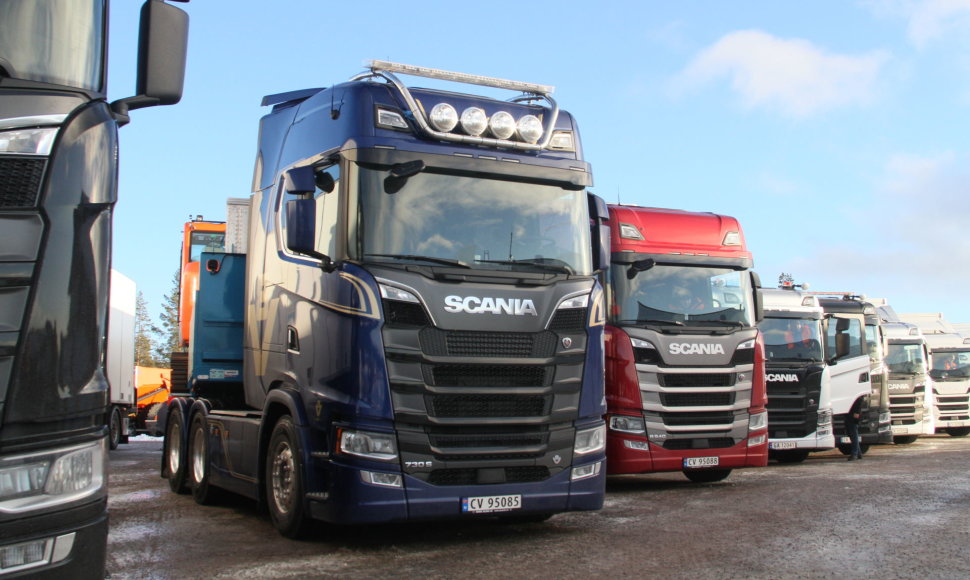A total of 7 514 new trucks were registered in Lithuania last year. It is almost one thousand less than in 2018. The company estimates that the sale of long-haul truck accounts for more than 80% of all sales of heavy-duty commercial vehicles. Darius Snieška, Retail Manager for Scania Lietuva, forecasts that as a result of the mobility package there would be a decline in the sale of such trucks. However, it is expected that the demand for vehicles for local transport is going to increase. "Old trucks and construction rangeused in the internal market will be modernised," he says. In this segment Scania Lietuva today holds 20 per cent of the market share.
"Last year we were able to increase our market share by focusing on what really matters to our customers – Scania has developed solutions aimed at increasing customer profitability, focusing on sustainability and ecology in response to market trends, and improving customer service. All this has improved the efficiency of the fleet of our customers. This has not gone unnoticed and is reflected in the results of our operations," points out Darius Snieška.
Scania offers the most appealing solution for those who care about the value of their vehicle and its maintenance costs in the medium and long term. Last year the company introduced a few innovations that improved the efficiency of its truck range.
In 2019, Scania upgraded 9 and 13 litter diesel engines, which helps to reduce fuel consumption by 2.5%. The company also introduced a new 13-litre 540hp engine, which, due to its economy, immediately attracted the attention of heavy-duty long-haul carriers. Scania's compressed natural gas (CNG) truck, which was tested by more than ten carriers last year, also generated a lot of interest in the market. According to the company's estimations, this vehicle, compared to the diesel one, will pay off in two years.
In 2019, Scania took another step in the area of sustainability – the company started educating the transport community by providing Lithuanian carriers with an opportunity to test compressed natural gas (LNG) trucks and see for themselves their benefits and sustainability. Such trucks have a longer mileage betweenrefuelling stops, which is very important for long-distance deliveries. This has changed the carriers' approach to sustainability and last year Scania Lithuania announced about the first acquisition of such trucks.
"We are the first in Lithuania to deliver both CNG and LNG trucks to our customers. We are happy with the first successful deals and the fact that the Lithuanian companies, by acquiring these trucks in cooperation with Scania, contribute to the reduction of CO2 emissions in our cities," points out Snieška speaking about ecology.
"The focus on sustainability is an important part of our philosophy, and this concerns not only the products we deliver but also our internal processes. A number of energy-efficient and responsible consumption solutions will be implemented in our offices and service centres this year. We are going to replace some business trip flights with video conference calls, we are promoting car sharing to our employees, we are encouraged to use less plastic in households and so on," implies Snieška.
Last year Scania Lietuva also made a significant step in digitising the company's internal processes. "To provide a quick and convenient solution to a problem we have improved the customer service in the service area. We have implemented a new system that captures real-time deviations from the service's internal processes. It enables service administrators to identify irregular processes and respond to them more quickly so that the serviced truck is returned to the customer at the agreed time," says Snieška.
This year Scania Lietuva will continue to focus on promoting sustainable solutions and improving customer service. The company also plans to expand its range of services and introduce the customers with joint fleet financing, maintenance and repair plans. Their price would be based on the number of kilometres travelled to provide the customer with the exact cost per kilometre, which includes all vehicle costs.
On the global level, the company intends to offer alternative fuel and electrification solutions aimed at the digitisation and autonomy of vehicles. This will change Scania transport in the near future.
Text translated by Metropolio vertimai – your trusted translation partner
---
Scania is one of the world's largest providers of transport solutions, working with its partners and customers to create a sustainable transport system. In 2018 the company sold 88,000 tractor units, 8,500 buses as well as 12,800 industrial and marine engines. Last year sales revenue accounted for more than €12 billion, 20% of which came for provided services.
Founded in 1891, Scania today operates in more than 100 countries and employs 52,000 people. Research and experimental development, as well as new product development, are concentrated in Sweden, Brazil and India. Production takes place in Europe, Latin America and Asia, with regional production centres in Africa, Asia and Eurasia.
Scania Lietuva, which has been operating since 2001, sells Scania products and provides their maintenance and repair services in Vilnius, Kaunas, Klaipėda and Šiauliai. The company also provides financing for the purchase of products.












